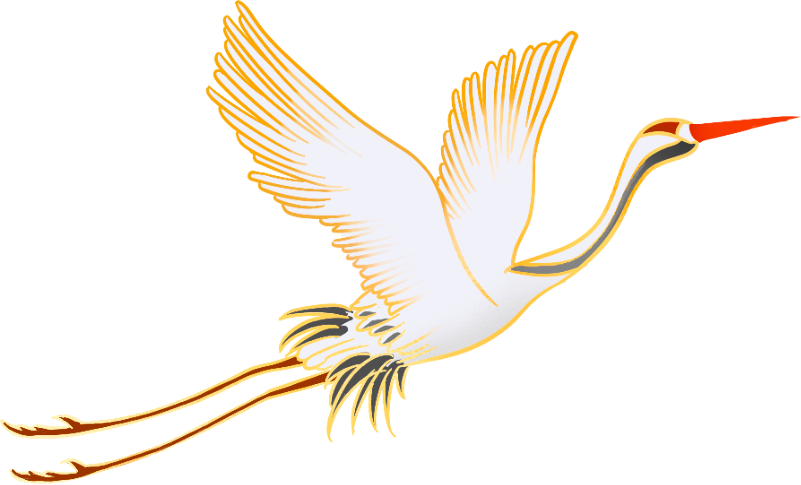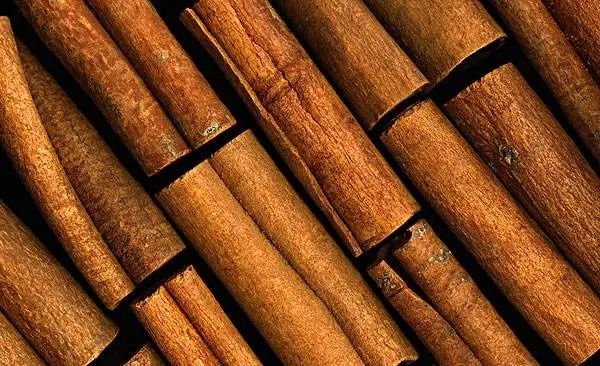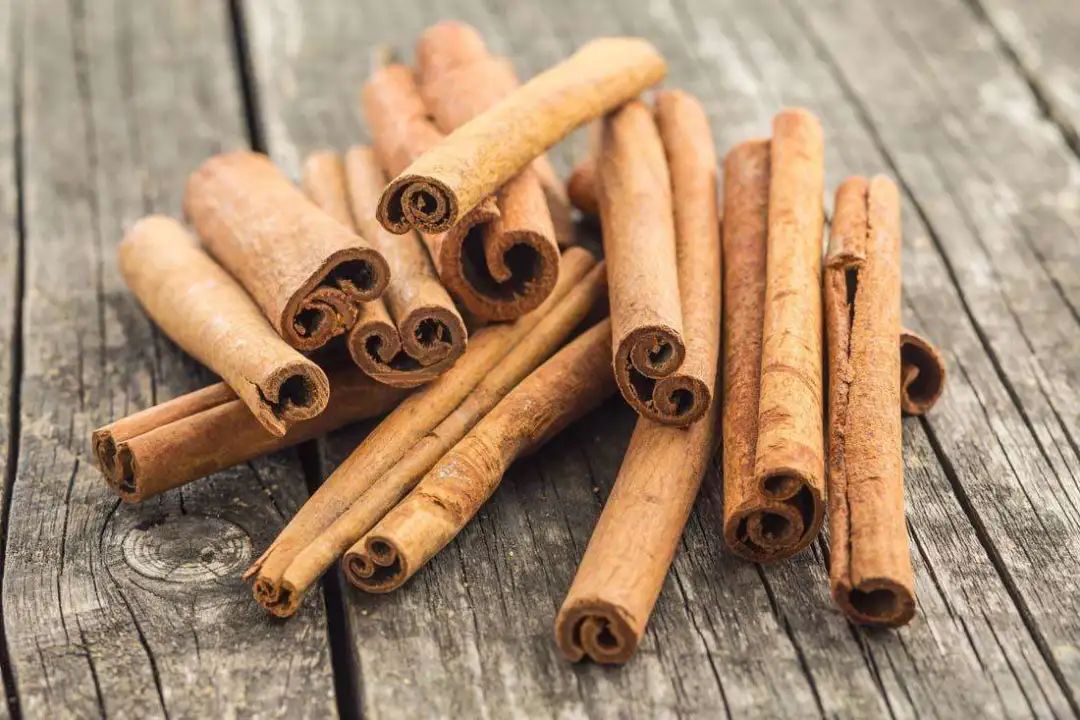Click the blue text to follow us

Every day we popularize a useful health-preserving Chinese herb
Cinnamon (Rou Gui)

Cinnamon is a medium-sized tree of the Lauraceae family, with gray-brown bark. The leaves are alternate or nearly opposite, elongated oval to nearly lanceolate, leathery, with cartilaginous edges, rolled inward, green, glossy, and hairless, with thick petioles. The flowers are borne in axillary or near-terminal racemes. The flowers are white, with petal lobes, and the filaments are covered with soft hairs, flat, and the anthers are oval to elongated. The fruit is oval-shaped, black-purple when mature, hairless, and the fruiting receptacle is shallow cup-shaped. The flowering period is from June to August, and the fruiting period is from October to December.

Originally from China, it is also found in India, Laos, Vietnam, and Indonesia. It prefers warm climates and humidity, but should not be waterlogged; excessive rain can cause root rot and leaf decay. Seedlings prefer shade, while mature trees require more sunlight for normal growth. This species requires deep, loose, well-drained, and highly permeable slightly acidic or acidic sandy loam or loam. Propagation can be done through suckering, cuttings, or seeds.
Effects and Functions of Cinnamon

1. Enhances Human Brain Function, Cinnamon contains a large amount of volatile oils and flavonoids, as well as some classified compounds. These nutrients, once absorbed by the body, can directly act on the human brain, nourishing brain nerves, enhancing brain cell activity, and promoting intellectual development. Regularly drinking cinnamon tea can also prevent memory decline.
2. Protects the Heart, It is well-known that the heart is the most important internal organ in the human body. If it undergoes pathological changes, it can endanger human life. Regular consumption of cinnamon can remove greasiness from food, enhance heart function, and reduce the burden on the heart and cardiovascular system. It not only prevents heart function decline but also helps prevent heart attacks and arrhythmias.
3. Aids in Weight Loss, Regular consumption of cinnamon can accelerate the burning and decomposition of body fat, allowing it to be expelled from the body along with metabolism. Additionally, cinnamon can enhance digestive function, speeding up bowel movements. Regular use can lead to noticeable weight loss. Cinnamon also enhances the skin’s antioxidant capacity, preventing skin aging and inhibiting the formation of wrinkles and pigmentation.
Medicinal Uses of Cinnamon
According to the “Tangye Ben Cao”: “It supplements the insufficiency of the Mingmen (Gate of Life) and benefits fire to eliminate yin.” The “Ben Cao Jing Shu” states: “It has a thick, sweet, and spicy taste, is very hot, and descends into the interior, thus cinnamon and cinnamon heart treat the insufficiency of true fire in the Mingmen, yang deficiency with cold movement in the interior, and all interior deficiency with yin cold, as well as diseases caused by cold evil in the interior.”

Cinnamon is often used in combination with dried ginger (Gan Jiang), Aconite (Fu Zi), cooked Rehmannia (Shu Di Huang), Cornelian cherry (Shan Zhu Yu), Sichuan pepper (Chuan Jiao), Schisandra (Wu Wei Zi), Angelica (Dang Gui), and Eucommia (Du Zhong) to enhance the effects of warming fire and assisting yang.
In warming and dispersing cold formulas, cinnamon has a spicy and hot flavor, which can warm and supplement spleen yang. It works in conjunction with other warming herbs such as dried ginger, Galangal (Gao Liang Jiang), and Piper (Bi Ba) to enhance the warming and supplementing effects on spleen yang. The heat can assist yang, and the spiciness can disperse cold, allowing the combined herbs to warm the interior, return yang, disperse cold, and alleviate pain, thus resolving symptoms of spleen and stomach deficiency with cold.
Contraindications of Cinnamon

01
Cinnamon is hot in nature, making it suitable for consumption in cooler weather, but it is best to limit intake in summer. Cinnamon has a blood-moving effect, so pregnant women should consume it with caution. Additionally, women with excessive menstruation, pelvic inflammation, sore throat, and other heat-related illnesses should avoid cinnamon. Furthermore, those with yin deficiency and excessive fire, bleeding, or constipation should not consume it.
02
Cinnamon contains coumarin, so it is best to consume it in small amounts and not frequently. Moldy cinnamon should also not be consumed.
03
It is not advisable to drink it with alcohol or on an empty stomach. When drinking Wuyi cinnamon tea, it is important to observe certain contraindications and drinking times. It should not be consumed with alcohol or on an empty stomach, as this can lead to feelings of hunger, dizziness, and nausea, commonly referred to as “tea drunkenness,” which is detrimental to health.
04
Wuyi cinnamon tea is best consumed warm; avoid drinking cold tea. This is because the tannins in cold cinnamon tea can combine with iron to form insoluble compounds, leading to insufficient iron absorption in the body, which is detrimental to the stomach and may trigger colds or worsen conditions in patients with anemia.
Correct Methods of Consuming Cinnamon
1. Cinnamon Brown Sugar Tea: 3-6 grams of cinnamon, 12 grams of brown sugar, boiled in water and strained, taken warm in two doses. This can treat postpartum abdominal pain in women: before menstruation, use 3 grams of cinnamon, 9 grams of hawthorn flesh, and 30 grams of brown sugar, boiled in an appropriate amount of water for three to five minutes, taken in two doses. This can alleviate abdominal bloating and pain during menstruation.
2. Lamb Cinnamon Soup: Add 6 grams of cinnamon to about 1 pound of stewed meat; after cooking, both the meat and soup can warm the interior, strengthen the stomach, warm the lower back and knees, and treat abdominal cold and bloating.
3. Cinnamon Powder: 3 grams of cinnamon, finely ground, taken twice a day with warm water, can assist with stomach bloating and cold pain; adding cinnamon powder to dishes can help control blood sugar and cholesterol.
4. Cinnamon Aconite Egg Soup: 3 grams of cinnamon, 9 grams of aconite, 1 egg, boil the cinnamon and aconite, strain, then add the egg, cook until done, and consume the egg and broth twice a day. This can assist with excessive vaginal discharge.


